- Administrator
- Albums and Singles
Karaoke Kalk
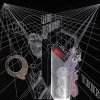 Also on the short side—but decidedly not as fun—is the third album from French musician, vocalist and poet Toog. The record is intended to be a modern variation on Poems For Lou, a book written during World War I by poet and soldier Guillaume Apollinaire who was inspired by a woman named Lou that he loved and lost in Nice before the war. In Toog's version, the role of the muse is played by actress Asia Argento, and WWI is replaced by the war and terrorism of the post-9/11 world. It's impossible for me to verify if Toog's words truly reflect these themes, as aside from two pieces that are sultrily spoken by Argento, all of the readings are in French, a language that I remember very little of from my lessons of many years ago. At least the music, which is produced by French sound artist Digiki, is generally quite nice, mixing together elements of downtempo electro & ambient with low-key pop & hip-hop, and even some hints of industrial, classical and cabaret. Given the strong poetic theme of the work, however, it's quite obvious that without some understanding of the words, listeners just won't get the full message that Toog is trying to convey in the 10 tracks on 'Lou Etendue'.
Also on the short side—but decidedly not as fun—is the third album from French musician, vocalist and poet Toog. The record is intended to be a modern variation on Poems For Lou, a book written during World War I by poet and soldier Guillaume Apollinaire who was inspired by a woman named Lou that he loved and lost in Nice before the war. In Toog's version, the role of the muse is played by actress Asia Argento, and WWI is replaced by the war and terrorism of the post-9/11 world. It's impossible for me to verify if Toog's words truly reflect these themes, as aside from two pieces that are sultrily spoken by Argento, all of the readings are in French, a language that I remember very little of from my lessons of many years ago. At least the music, which is produced by French sound artist Digiki, is generally quite nice, mixing together elements of downtempo electro & ambient with low-key pop & hip-hop, and even some hints of industrial, classical and cabaret. Given the strong poetic theme of the work, however, it's quite obvious that without some understanding of the words, listeners just won't get the full message that Toog is trying to convey in the 10 tracks on 'Lou Etendue'.
samples:
Read More
- Administrator
- Albums and Singles
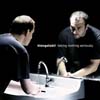 After several releases for various labels, this German duo release their first full length for Ant-Zen. The album covers a wide variety of styles and textures in a concise 42 minutes. Over eight tracks they attempt to achieve a balance between melodic and abrasive elements.
After several releases for various labels, this German duo release their first full length for Ant-Zen. The album covers a wide variety of styles and textures in a concise 42 minutes. Over eight tracks they attempt to achieve a balance between melodic and abrasive elements.
The most extreme example of this juxtaposition is "A Difference That's For All To See." While the three preceding tracks are linear in structure and feature vocals set to danceable rhythms, this fourth track is of two halves. The first half consists of slowly shifting, atmospheric loops. At first this sounds like an intro to something chaotic, but after three minutes it seems that the track will remain ambient. 30 seconds later a short burst of feedback announces the track's sudden shift into full-on grindcore, complete with ramshackle drumming and distorted vocals. This is directly followed by "Away," a lush instrumental with a melodic, almost calming feel. Without the clutter of vocals it was easier to enter the space they were trying to create. While musically the album is very successful, vocally it is more problematic. The vocals provide a sharp contrast to the melodic elements, the tension they create in these tracks makes me feel claustrophobic, and they're so loud in the mix that they often overpower the music. This is especially evident on "Gloomy Day", "Push Yourself" and the album-closing "Kill All Lifeforms." It is unclear from what perspective the lyrics to this track have been written. The sentiment, taken at face value, seems extremely negative, with lyrics such as "thoughts of making things better in the future are unnecessary, thank you. You don't have the future for that." Although they have been written in the first person, it is possible that these lyrics are meant as social commentary. Given the current state of the world, promoting violence and negativity seems unnecessary. In contrast, lyrics such as "follow your dreams, with one step forward" and "rediscover yourself, your pride, your dignity, your holiness, force and weakness, love and passion" on "Push Yourself" are much more hopeful, and this contrast suggests that on all tracks the vocalist is referring to someone other than himself. I often prefer when an artist creates an atmosphere which suggests an idea without stating it as obviously as Klangstabil have done on some of these tracks. To their credit, Taking Nothing Seriously is a much more eclectic set than many of their contemporaries attempt. It would have been a more enjoyable listen if it had been balanced a little more toward subtleties.
samples:
Read More
- Administrator
- Albums and Singles
aRtonal
 In an era when so many guitarists have taken to laptop processing in order to coax new life from their thought-tired instruments, it seems only fair that other solo-instrumentalists should join the fun. And while the cello has enjoyed its fair share of fusion within the rock sphere, I've yet to see someone sit alone with this instrument, so engorged with classical and acoustic traditions, and really "plug in." Part of what makes Arnold Haberl's output as Noid so fascinating is the way the Austrian cellist moves beyond a banal, deconstructivist treatment of his playing and into ideas for composition where the computer feels less like a medium guiding the production of a piece and more like a voice within the music, to be engaged and countered, rather than simply played-through. Haberl's pieces branch off of strict minimalist ideas, bypassing crude layering techniques of the analog past and instead favoring tightly-wound, stuttering loop effects, drawn out often to the realm of nauseous formalism. Rarely is any multi-tracking involved in Noid's creations; rather miniature fragments of playing are captured, treated, and allowed to loop out, at times for over ten minutes with no real variation. The cello's woody groan becomes an industrial sander on the opening "melodien," stripped of human presence, even a performer's pause or the negative space of a hand slightly off-beat. It's clear after such a beginning that this will be "process" music, here less about the process of making, which becomes increasingly transparent as the disc progresses, and more about the process of listening, of accepting the music's sensory overload in juxtaposition with virtual lifelessness of the sounds themselves and the possibility of their "performance." Haberl does perform with live sampling and manipulation, and the points on Monodigmen where his cello is left recognizable logically become some of the most mind-numbing. "Vacuum 1" is a 12-minute piece of the cellist in lock-groove mode, struggling around what sounds like the opening strains of "Flight of the Bumblebee." After the question of Haberl actually playing such an infernal half-measure over and over again has been ruled out, listening becomes a tug-of-war between enduring the instrument's stunted flight and the utter detachment resulting from the search for patterns, or anything "material" in the music, and finding nothing. I hesitate to dismiss Noid's music as a purely formal exercise because of the way he continuously engages the elements of poise and human concentration almost inseparable from his chosen instrument, in an ultimate reduction of all that is traditionally expressive about it. There are times when Monodigmen feels like an extension of Cage's efforts to communicate the zen-like void or 'nothing' in musical composition; other times, however, Haberl's creation seems too much of an endurance test to communicate anything worth the time it takes to get there.
In an era when so many guitarists have taken to laptop processing in order to coax new life from their thought-tired instruments, it seems only fair that other solo-instrumentalists should join the fun. And while the cello has enjoyed its fair share of fusion within the rock sphere, I've yet to see someone sit alone with this instrument, so engorged with classical and acoustic traditions, and really "plug in." Part of what makes Arnold Haberl's output as Noid so fascinating is the way the Austrian cellist moves beyond a banal, deconstructivist treatment of his playing and into ideas for composition where the computer feels less like a medium guiding the production of a piece and more like a voice within the music, to be engaged and countered, rather than simply played-through. Haberl's pieces branch off of strict minimalist ideas, bypassing crude layering techniques of the analog past and instead favoring tightly-wound, stuttering loop effects, drawn out often to the realm of nauseous formalism. Rarely is any multi-tracking involved in Noid's creations; rather miniature fragments of playing are captured, treated, and allowed to loop out, at times for over ten minutes with no real variation. The cello's woody groan becomes an industrial sander on the opening "melodien," stripped of human presence, even a performer's pause or the negative space of a hand slightly off-beat. It's clear after such a beginning that this will be "process" music, here less about the process of making, which becomes increasingly transparent as the disc progresses, and more about the process of listening, of accepting the music's sensory overload in juxtaposition with virtual lifelessness of the sounds themselves and the possibility of their "performance." Haberl does perform with live sampling and manipulation, and the points on Monodigmen where his cello is left recognizable logically become some of the most mind-numbing. "Vacuum 1" is a 12-minute piece of the cellist in lock-groove mode, struggling around what sounds like the opening strains of "Flight of the Bumblebee." After the question of Haberl actually playing such an infernal half-measure over and over again has been ruled out, listening becomes a tug-of-war between enduring the instrument's stunted flight and the utter detachment resulting from the search for patterns, or anything "material" in the music, and finding nothing. I hesitate to dismiss Noid's music as a purely formal exercise because of the way he continuously engages the elements of poise and human concentration almost inseparable from his chosen instrument, in an ultimate reduction of all that is traditionally expressive about it. There are times when Monodigmen feels like an extension of Cage's efforts to communicate the zen-like void or 'nothing' in musical composition; other times, however, Haberl's creation seems too much of an endurance test to communicate anything worth the time it takes to get there.
samples:
Read More
- Administrator
- Albums and Singles
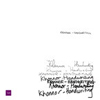 Youth and painfully melodramatic vocals don't spell out "genius" in big, bold letters. While much of the music that this 17 year-old old writes sounds nice (in terms of production), many of his songs are covered in a too-sweet glow that renders all the glorious fuzz and inherent beauty of his guitar work null. Connor Kirby-Long makes music full of good ideas: at times his arrangements hint at a desire to push his own songwriting abilities forward, but all too often this results in a stifling inertia where nothing goes anywhere. There's huge washes of electronic buzz permeating every corner of every song, but this isn't enough to carry the record all by itself.
Youth and painfully melodramatic vocals don't spell out "genius" in big, bold letters. While much of the music that this 17 year-old old writes sounds nice (in terms of production), many of his songs are covered in a too-sweet glow that renders all the glorious fuzz and inherent beauty of his guitar work null. Connor Kirby-Long makes music full of good ideas: at times his arrangements hint at a desire to push his own songwriting abilities forward, but all too often this results in a stifling inertia where nothing goes anywhere. There's huge washes of electronic buzz permeating every corner of every song, but this isn't enough to carry the record all by itself.
When Khonnor does decide to lay off all the hiss, his guitars sound plain and relatively flat. "Crapstone" highlights this problem; the keyboards sound like they're being forced out of an old toy that Khonnor must've gotten when he was six and the guitar that is strolling along over it sounds like the work of a disinterested street musician floundering about lazily on his guitar whenever an attractive lady walks by. Other songs show promise, but never reach any kind of satisfying climax. It's Khonnor's age that really shines through this record, not his purported infinite talent. "Kill 2" skips along with an innocent cadence and might sound just fine if it weren't for the dramatic melodies that echo between the keyboards and heavily processed computer-melodies. When he sings it comes out as though he's whispering to someone whom he's in love with, but instead of being sure of himself he tilts back and forth and emphasizes all the wrong aspects of what he has to say. There are a couple of songs ("A Little Secret" comes immediately to mind) where his voice doesn't interrupt anything and all the instruments work very well together. The result are interesting but not enthralling strands of sound. I'm sure there are lots of teenagers in basements across the world that are making lots of music; there's nothing unique or especially outstanding about this one except that he's very obviously ambitious. I can't recommend the CD, however, because there's just not enough material in here to make me want to listen to the record over and over again. Perhaps time and experience will lend Khonnor the songwriting ability he needs to compliment his energetic ideas, but until then his music is all decoration and no substance.
samples:
Read More
- Administrator
- Albums and Singles
Tesco
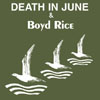 Ever since unleashing the amazing one-two punch of But What Ends When the Symbols Shatter? and Rose Clouds of Holocaust, Douglas P. has been creatively floundering. His teaming with Albin Julius of Der Blutharsch yielded two albums that abandoned all of Death in June's usual subtlety and atmosphere in favor of overblown orchestral loops littered with samples from Leni Riefenstahl films and filled with laughable lyrics about Kristallnacht and anal sex. Then came the nadir, 2001's All Pigs Must Die, a prolonged screed against the now-defunct World Serpent Distribution that played like a vicious self-parody. Now comes the new album, a collaboration with fellow fascist sympathizer Boyd Rice. I might have expected them to produce some kind of martial epic extolling the virtues of Bush's imperialist wars, but instead they opt for a more personal album, a return of sorts to the guitars-and-windchimes sound that characterizes classic Death in June. As could be expected, every track is overloaded with excessive echo and reverb, and most are scattered with dialogue snippets from cult films, a familiar DIJ tactic. Unfortunately, Douglas P. has not learned any new chords, recycling the same dull strumming he's been churning out for twenty years. Boyd Rice provides vocals for most of the tracks, in his familiar I-can't-bothered-to-sing monotone. "Sunwheels of My Mind" is almost clever, a solar-centric adaptation of Dusty Springfield's classic "Windmills of My Mind." The album's lyrics deal primarily with the passage of time (punctuated by the Alarm of the title) and a preoccupation with solar imagery. It's the old familiar sun = light = Lucifer = Satan = power equation, a fairly juvenile symbolic conceit coming from a pair of middle-aged men. All that being said, I still liked this much, much better than All Pigs Must Die or the recent Wolf Pact album. It's a big improvement over Nazi tape-loops and boring personal vendettas, but its appeal is largely nostalgic—it reminds me of a time when DIJ were slightly relevant. At this point, I'm not holding out much hope that Douglas P. will ever come up with another truly worthwhile album.
Ever since unleashing the amazing one-two punch of But What Ends When the Symbols Shatter? and Rose Clouds of Holocaust, Douglas P. has been creatively floundering. His teaming with Albin Julius of Der Blutharsch yielded two albums that abandoned all of Death in June's usual subtlety and atmosphere in favor of overblown orchestral loops littered with samples from Leni Riefenstahl films and filled with laughable lyrics about Kristallnacht and anal sex. Then came the nadir, 2001's All Pigs Must Die, a prolonged screed against the now-defunct World Serpent Distribution that played like a vicious self-parody. Now comes the new album, a collaboration with fellow fascist sympathizer Boyd Rice. I might have expected them to produce some kind of martial epic extolling the virtues of Bush's imperialist wars, but instead they opt for a more personal album, a return of sorts to the guitars-and-windchimes sound that characterizes classic Death in June. As could be expected, every track is overloaded with excessive echo and reverb, and most are scattered with dialogue snippets from cult films, a familiar DIJ tactic. Unfortunately, Douglas P. has not learned any new chords, recycling the same dull strumming he's been churning out for twenty years. Boyd Rice provides vocals for most of the tracks, in his familiar I-can't-bothered-to-sing monotone. "Sunwheels of My Mind" is almost clever, a solar-centric adaptation of Dusty Springfield's classic "Windmills of My Mind." The album's lyrics deal primarily with the passage of time (punctuated by the Alarm of the title) and a preoccupation with solar imagery. It's the old familiar sun = light = Lucifer = Satan = power equation, a fairly juvenile symbolic conceit coming from a pair of middle-aged men. All that being said, I still liked this much, much better than All Pigs Must Die or the recent Wolf Pact album. It's a big improvement over Nazi tape-loops and boring personal vendettas, but its appeal is largely nostalgic—it reminds me of a time when DIJ were slightly relevant. At this point, I'm not holding out much hope that Douglas P. will ever come up with another truly worthwhile album.
samples:
Read More
- Administrator
- Albums and Singles
PALESTINE is one of the cornerstones of YANN TIERSEN's next album DUST LANE. Ici,d'ailleurs asked some members of collective This Immortal Coil (DEADVERSE [Dälek], CHAPELIER FOU, THE THIRD EYE FOUNDATION [Matt Elliott] and Yann Tiersen himself) to deliver their own reading of this emblematic track for a EP to be released in vinyl only.

PALESTINE, an original track and 6 interpretations by 6 strong-tempered personalities...
Cornerstone of YANN TIERSEN's next album DUST LANE, PALESTINE stands at the crossroads of the artist's multiple talents. It is the expression of an itinerary without fail where the toy piano harmonises altogether with the electronic instruments, Dave Collingwood's implacable drums and Matt Elliott's characteristic voice. An invitation to travel, in an undoubtedly troubled time, but, above all, a humanistic hymn beyond boundaries, reflecting unfailing hope.
Ici,d'ailleurs asked some members of collective This Immortal Coil (of which Yann Tiersen himself) to deliver their own reading of this emblematic track.
DEADVERSE (Dälek) gives the opening shot with a version worthy of an armoured division ready to blast away all genres and walls; heavy hip hop with industrial rhythms, both insistent and devastating, for modern dancefloors.
CHAPELIER FOU, with a complex rhythmical cartography - in the vein of his début album to also be released in March - cleverly de-constructs the boundaries of PALESTINE in a sequenced slow motion crumbling, like a deeply moving continuous shot where sound gives life to images.
MATT ELLIOTT brings his project The Third Eye Foundation back to life for a totally unbridled comeback and blows minds away with his unique dark shadowy dub to once more prove the obvious universality of his language.
YANN TIERSEN, in trans-genre-hobo way, brings peace to his track by opening its own boundaries to the spectres of serial composers, of German precursors of the digital age as well as the post-Timothy Leary of the years 2000, to deliver a yet unknown face of the artist.
The PALESTINE EP will be release in march 2010 in 12" vinyl with a download coupon (the digital version includes a 20 mn bonus version from ORKA )
The limited colored vinyl edition (500 red / 500 green) will only be available by mail order or during the concerts.

Preorder now & choose your color
The 18 first copies of each series (except black) will be signed by Yann Tiersen.
Orders will be sent on mid-march.
Read More
- Creaig Dunton
- Albums and Singles
 While comparisons to Cold Cave are going to be somewhat inevitable in this day and age, this four track EP from Clockcleaner vocalist/guitarist John Sharkey III embraces the new wave nostalgia to some extent, but the result is closer to early '80s death rock than the more synth heavy projects, owing far more to the likes of Christian Death than New Order.
While comparisons to Cold Cave are going to be somewhat inevitable in this day and age, this four track EP from Clockcleaner vocalist/guitarist John Sharkey III embraces the new wave nostalgia to some extent, but the result is closer to early '80s death rock than the more synth heavy projects, owing far more to the likes of Christian Death than New Order.
The four tracks that comprise this 12" follow a similar recipe, but never feel overly redundant or repetitive. The opening "Not My Idea" joins a fuzzed out bassline to a monotone drum beat. The funeral march is fleshed out with some very 1980s analog synth parts and deep, monotone death rock vocals. "Torture" mines similar territory, with slow pounding echoed drums and morose vocals, all of which plods along depressingly.
"Let’s Make Friends" has a bit more "rock" sound to it, the synths and drums are a lot sharper and there’s a more traditional verse/chorus/verse structure to it, but still with the same dour and angry sound to it. The shorter "This Is Murder" immediately calls to mind something off The Cure’s Faith, but with all of the production and reverb stripped away to near nothingness.
The embracing of 1980s synth sounds on here will surely put it next to the likes of Cold Cave, but the results are quite different. There is a more stripped down organic feel here, with most of the tracks being only bass, synth, drums and vocals in various configurations, without a lot of post-production or effects. The sound is nature and sounds a lot more like it was recorded to a 4 track instead of a Macbook. It also carries over a good amount of the sleaze from Clockcleaner, but focusing much more on the goth sounds of them than the scuzz-rock of that band. The vocals occasionally start to go a bit too far into rock territory, contrasting with a genre that’s normally more restrained in its approach, but the shift isn’t too strong as to kill the vibe of the material.
Read More
- Administrator
- Albums and Singles
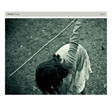 Having been stalwarts in the Japanese electroacoustic microsound scene for over a decade now, the quartet has always focused on unifying the usually disparate worlds of laptop based programming and improvised organic music. For their second release on the 12k label, they have done exactly that, marrying acoustic guitar with software patches, all presented in a warm, post-rock influenced analog audio bath.
Having been stalwarts in the Japanese electroacoustic microsound scene for over a decade now, the quartet has always focused on unifying the usually disparate worlds of laptop based programming and improvised organic music. For their second release on the 12k label, they have done exactly that, marrying acoustic guitar with software patches, all presented in a warm, post-rock influenced analog audio bath.
The opening of "Elementary Domain" matches beeping tones and distant noises with the untreated pure sound of guitar strings and bells. The structure is definitely one of a more abstract and laptop-composed nature, but the parts used are definitely warm ambient pop, weaving together a complex piece that is far more natural and inviting than expected. "Help Ourselves" has a similar feeling to it, but employs a great deal of warm piano, shimmering analog strings, and all so subtle laptop noises.
Surprisingly enough, the remainder of the songs are, for the most part, actually more "natural" sounding. "When Unwelt Melts" is a slow building piece that begins with the gentle chimes of a music box, with a bit of acoustic guitar above. As it continues, the addition of analog and digital instrumentation fleshes out the song, leading through a natural evolution that delicate and beautiful. "Helical Scenery" also joins acoustic guitar and shaker percussion with soft synth textures. As the track is given room to grow and change, lush accordion-like tones and more pronounced guitar intermingle above the subtle keyboards.
Towards the latter half of the disc the music becomes slightly more forceful and obtuse, but never out of control. "Be Born" mixes lush, infinite harmonium and harmonica passages with abstract organ noodling, and by the time the massive, crashing percussion shows up at the end, the track rivals some of the best krautrock out there. The long piece, "First Breathing At Last," again uses the digital elements as instruments alongside synths and guitar to create a structured, yet rhythmically disjointed piece that definitely has structure to it, but a very abstract and esoteric one. The track allows the heavier synths and electronics to rise up at the end, creating a heavy, but not oppressive sensation.
One thing that separates them from so many other laptop artists is the fact that Minamo is a band. They play together, mostly working with live recordings, and use laptops and other digital based technology as instruments, not as a crutch. The music they create has that organic, "live" feel to it, even though the instrumentation is at times anything but traditional. Like label mates Small Color, there is a warmth and soul here, proving that digital music does not need to be abrasive and inhuman.
samples:
Read More
- Administrator
- Albums and Singles
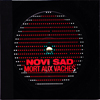 After successful releases on Sedimental and Tilt Recordings Thanasis Kaproulias was invited to the venerable VPRO Radio to perform a piece live, and unsurprisingly it has been released on the Staalplaat label for the rest of the world to hear. The single 47 minute track covers the composer’s sound as it is being refined, capturing elements of other artists such as Francisco Lopez and Bernhard Gunter, but still retaining an identity all his own.
After successful releases on Sedimental and Tilt Recordings Thanasis Kaproulias was invited to the venerable VPRO Radio to perform a piece live, and unsurprisingly it has been released on the Staalplaat label for the rest of the world to hear. The single 47 minute track covers the composer’s sound as it is being refined, capturing elements of other artists such as Francisco Lopez and Bernhard Gunter, but still retaining an identity all his own.
The earliest parts of the performance are most inline with Gunter’s work, consisting of an extremely quiet hiss with microscopic textures that are almost psychoacoustic in their changes. It has a slow build in volume and texture, with shrill tones appearing extremely low in the mix, but still enough to be noticeable. Kaproulias’ penchant for shocking the listener is definitely here, as on his previous work, with an abrupt, violent clattering of field recorded noise crashing in unexpectedly. This appears as a loop, with the subsequent reprises being far less violent and jarring than the first.
The hiss continues under the clattering, which eventually rises into a rushing stream of white noise: a monochrome hiss that initially sounds like simply static, but slowly morphs into a complex composition of chaotic sound. Under the dissonance of the noise, tones that resemble a processed piano appear below the blanket of sound. Occasionally a rhythmic blast of destroyed digital sound comes up to act as a counterpoint to the more inviting tonal elements, but it never lasts for long.
The white noise cuts in and out in Kaproulias’ preferred style, eventually reappearing more as an apocalyptic swarm of locusts that swells into harsh stuttering noise, with the piano-like tones holding on for dear life amidst the end of the world chaos that surrounds it. Eventually it all relents, with the closing minutes mirroring the first moments of near silence, which left me on edge for another moment of jarring noise that never quite happened.
Novi_sad’s style obviously works in a live context, as it does in a more composed studio format. The overall structure is one that is more restrained and minimalist than what was showcased on his other releases, but it never feels overly limited or simplified at all. As usual, the label has packaged this radio performance in a unique way, this time in a digipak style fold-out made of recycled LPs, held together by the ubiquitous center pin. It has a cool appearance to it, and from the sound of other reviews, it’s not going to render the disc unplayable.
samples:
Read More
- Administrator
- Albums and Singles
 The debut release from this synthesiser duo of Andrew Fogarty and Ivan Pawle is a raw but ultimately unsatisfying release which fails to capture the full potential of the group. The basic ingredients are here but they have not come together yet. That being said, this is far from a bad release but based on this EP alone there is not a lot to separate Boys of Summer from the countless other CD-R/tape culture groups out there.
The debut release from this synthesiser duo of Andrew Fogarty and Ivan Pawle is a raw but ultimately unsatisfying release which fails to capture the full potential of the group. The basic ingredients are here but they have not come together yet. That being said, this is far from a bad release but based on this EP alone there is not a lot to separate Boys of Summer from the countless other CD-R/tape culture groups out there.
Like any newborn creature, here Boys of Summer take their first uncertain steps, still covered in the glistening afterbirth that protected them until now. With V they show signs of their capabilities but fail to co- ordinate them properly. “Summertime Greys” at first sounds like a deformed and far lengthier cousin to Throbbing Gristle’s “Industrial Introduction” before launching off into the upper regions of the atmosphere and hovering unnaturally. However, it begins to shudder after a while and falls back down to earth; the piece seems to be far longer than it needs to be. Although, they do rescue it at the very end with a monster jam that sounds like reality rupturing but unfortunately the momentum is lost too early in the piece to salvage it fully.
“Aerial Harassment” finally sees Boys of Summer firing on all cylinders. The queasy dissonance creating a haze of upset noises which show what kind of power is lurking within these men and their machines. It is probably no coincidence that this sudden burst of incredible music features two extra musicians who help expand the range of the group beyond the straightforward but interesting take on jamming with synths that makes up the rest of the EP. Finally, the bonus track on the 2nd edition of this EP, “Zoned out of Life” revisits the ground explored during “Summertime Greys.” This piece is less busy than “Summertime Greys” and works better overall but misses out on the awesome ending of “Greys.”
Having seen these guys live (and based on their second EP, click here for more on that), I know they have more going for them when they get into their stride. The untempered music has its moments of power and V and even at its weakest, it is still a decent exploration of the limits of analogue synths. Yet at the end of the day, V feels more like a warning shot than a fully realised work.
samples:
Read More
- Administrator
- Albums and Singles
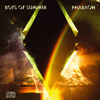 Expanded to a three piece, this second EP from Dublin’s Boys of Summer hits all the spots that V failed to tickle. With a far richer palette of tones at their disposal, the group offer an immensely satisfying journey through the dustier regions of that piece of meat between the ears that calls itself a brain. Like transmissions from another planet, these three pieces are alien sounding and utterly bewitching.
Expanded to a three piece, this second EP from Dublin’s Boys of Summer hits all the spots that V failed to tickle. With a far richer palette of tones at their disposal, the group offer an immensely satisfying journey through the dustier regions of that piece of meat between the ears that calls itself a brain. Like transmissions from another planet, these three pieces are alien sounding and utterly bewitching.
Immediately Pharaoh sounds fuller than its predecessor V. The combination of a smooth but rumbling low end and some of the most beautiful synth tones I have heard this side of Venus make the opening title track sound as regal as the ancient kings it takes its name from. Undulating slowly over the course of the track, the drones coaxed out of the machines by their operators create a hypnotic, vivid tapestry of sound. Unfortunately, at just over 9 minutes, it is way too short.
Luckily there’s plenty more where that came from. Both “Coriolis” and “Beyond” are exceptionally good, the textures created by the various players in both tracks feel like the shimmering expanse of space. “Coriolis” battles with “Pharaoh” for being the highpoint of this EP, its epic scope makes me feel like the insignificant speck of dust I am in the universe but in a totally wonderful way. The humming ambience rolls like waves across the room, expanding as it moves towards me. Taking things down a peg, “Beyond” is less captivating than its counterparts on this CD-R but it is still a beautiful piece and caps off Pharaoh nicely.
Along with Emeralds, Oneohtrix Point Never and their ilk, Boys of Summer are a group who are taking the things I love about bands like Cluster, Coil and the spacier side of Ash Ra Tempel and explore the territory these greats first claimed in the name of music. I am not sure whether Boys of Summer (or indeed any of the new wave of Kosmiche music) have reached the lofty peaks of these pioneers but they certainly show with Pharaoh that they mean to travel far further into the deep space of the synthesiser than many dare to go.
samples:
Read More

